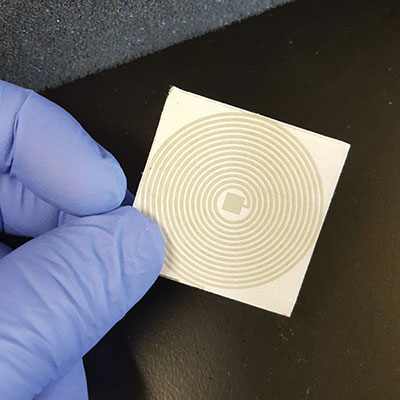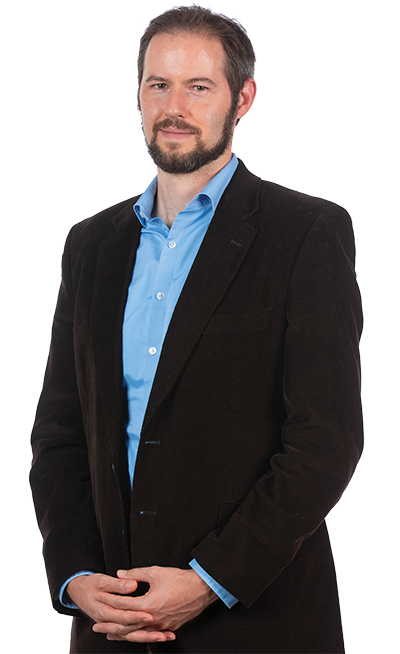“When I was at DuPont, one of my roles was a technology scout, looking around for the best ideas that would be useful for core businesses, and I started to see that many other companies were looking to university professors as well to develop the next wave of innovation,” said Reuel, assistant professor of chemical and biological engineering. “I realized where I could really push innovation and bring together teams of strong players would be joining academia.”
Since coming to Iowa State, Reuel has succeeded in becoming the “entrepreneurial professor” he set out to be.
New sensors for biotech
Reuel’s research focus is sensors for closed systems and sits at the intersection of chemical engineering, biology and materials science. His group has made key discoveries for unmet needs across biotechnology.
Reuel has developed new types of resonant radio-frequency sensors to wirelessly monitor soil enzymes, deformation in soft materials, wounds and even sweat rate under firefighters’ PPE.
“We’ve created novel methods in coating sensors with enzyme substrates to quantify hydrolytic enzyme activity in closed systems, along with first demonstrations of non-powered devices – all while reducing costs and size of sensor readers,” said Reuel.
The group has also gone to the nanoscale to take on the big challenge of measuring activity of industrial enzymes widely used as biocatalysts. Reuel uses the natural fluorescence and surface sensitivity of single walled carbon nanotubes in modular sensors to measure enzyme activities on their native substrates.
Supporting the group’s work is an expertise in rapidly prototyping proteins used for sensors and new algorithm and hardware development for sensor reading and data processing.
Startup delivers shortcuts
“With these four core research areas in place, we are now in the exciting phase of combining them to make innovations in diagnostics, pharmaceuticals and precision agriculture,” said Reuel.
So far the group has made 12 technology disclosures, seven of which are in patent prosecution, and two licensed by Reuel’s National Science Foundation-awarded startup, Skroot Laboratory Inc., which is incubating on the north side of the Iowa State campus in the Carver Co-Lab.
Skroot’s flagship product is a sensor system that attaches outside of bioreactors and provides real-time, contact-free monitoring of cell density. The product is a shortcut (skrót is Polish for shortcut) for critical process measurements that are currently done by manual sampling.
“It has been exciting to watch the technology grow and rapidly flourish outside of the academic lab. These sensors are on real reactors, providing real data, and real value to customers to reduce cost of therapies and improve speed to market,” said Reuel. “It has also been great to hire talented students as they graduate from Iowa State to stay and build the company. I see many other startups coming from my academic group on the near horizon.”
Tomorrow’s innovators
Reuel is as set on mentoring the next generation of innovators as he is on creating innovations. He encourages all students in his group to participate in entrepreneurship training and do external co-ops so they can “speak both languages” of industry and academia.
According to Reuel, Iowa State offers students and faculty researchers a uniquely fertile ground to develop new ideas and products.
“Iowa State is very supportive and has facilities and incubating space both on campus and very near to campus,” said Reuel. “Plus federal grant resources and boot-strapped startup funds go really far in this lower-cost part of the country, so you can move faster and hit your milestones with greater success than I experienced and witnessed in higher-cost ‘hub’ cities. Fellow faculty and students here are fantastic. We really do live in ‘fields of opportunity’ as the state tourism slogan goes.”

New resonant sensors for closed systems
 Nigel Reuel, assistant professor of chemical and biological engineering
Nigel Reuel, assistant professor of chemical and biological engineering